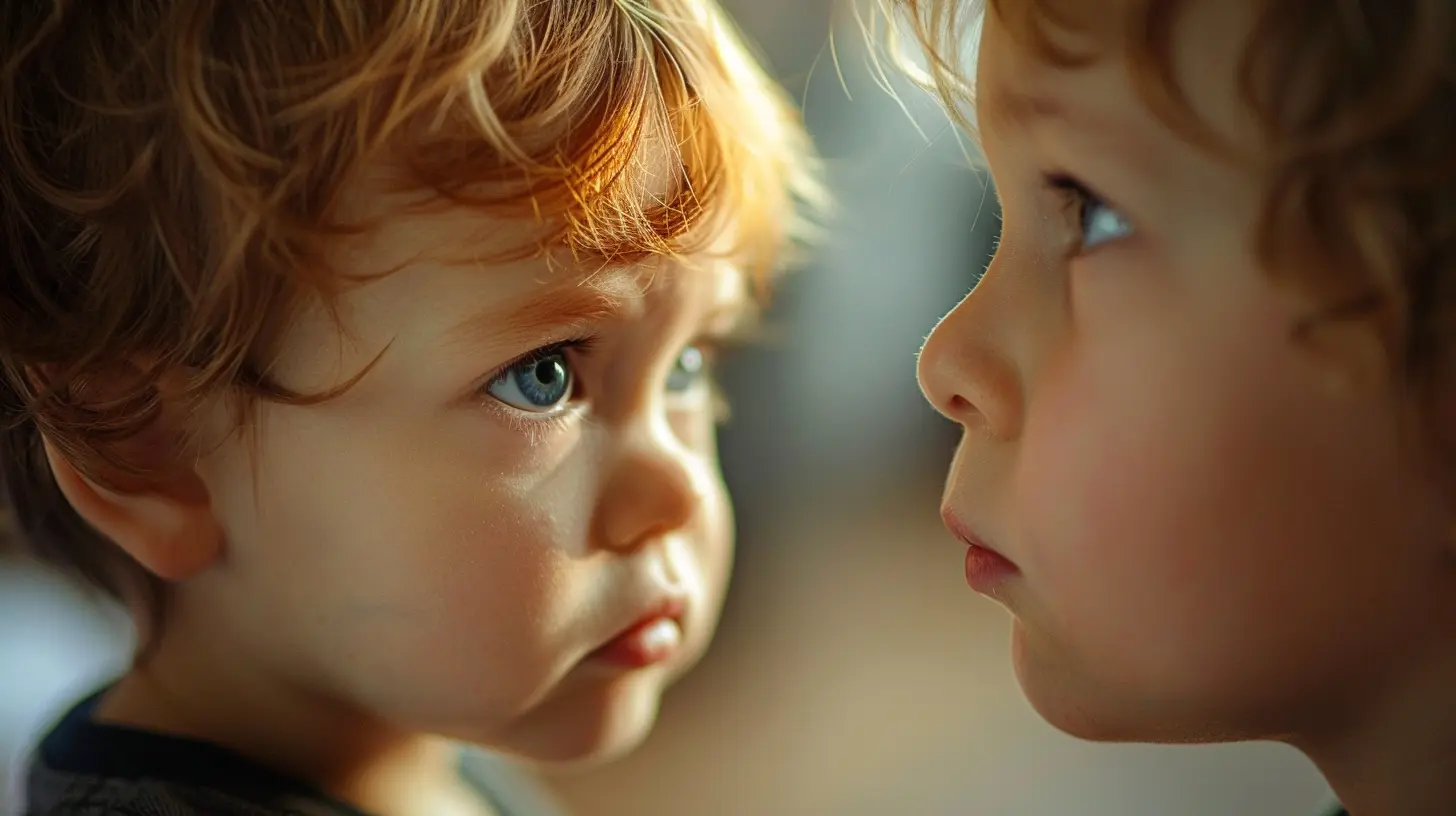How to Talk to Your Preschooler About Big Topics
13 September 2025
Parenting is a wild ride, isn’t it? One minute you’re teaching your preschooler how to tie their shoes, and the next, they’re staring up at you with those wide, curious eyes asking questions about things you didn’t expect to tackle for years. Why do people get sick? Where do babies come from? What happens when someone dies?
Big topics like these can leave even the most prepared parents fumbling for words. But here’s the deal—you don’t have to be perfect. The fact that your little one is opening up and asking questions is a win in itself! So how do you take these "big, scary" topics and break them down in ways your preschooler can understand? Let’s dive in. 
Why Talking to Preschoolers About Big Topics Matters
Kids are sponges, aren’t they? They pick up on everything—the good, the bad, and the downright confusing. If you don’t talk to your child about the world’s weighty issues, someone else might, and their version might not align with your values or provide the comfort your child needs.Preschoolers are at that magical age where their brains are developing at lightning speed. They’re forming ideas about themselves, others, and the world around them. Having open, honest, and age-appropriate conversations builds trust and helps shape their understanding of complex topics in a healthy way. 
Keep It Simple: Start at Their Level
Let’s be real—preschoolers don’t need a college lecture on global warming or a deep dive into the human anatomy. Overloading them with too many details or jargon can overwhelm them. Instead, meet them where they are.For example, if your child asks, “Why does the sky cry?” (a.k.a. why does it rain?), you can say something like:
“Well, clouds are like big fluffy sponges. When they get too full of water, the water falls back to the ground as rain. It helps plants grow and gives us drinking water!”
See what we did there? A simple analogy paints a clear picture without making it too technical. 
Listen First, Then Respond
When a preschooler shoots a tricky question your way, your first instinct might be to launch into an explanation. But hold up! Take a second, breathe, and ask them what they think first.For instance:
Your preschooler: “What happens when people die?”
You: “That’s a really good question. What do you think happens?”
Kids are naturally imaginative, and sometimes their answer might surprise you. They might already have thoughts or worries you can address directly. By listening first, you’re showing them their opinion matters, and you get to tailor your response to fill in the gaps. 
Big Topic #1: Death
Let’s start with one of the heaviest of the big topics—death. It’s tough, I know. But unfortunately, it’s also unavoidable. Whether it’s the loss of a pet, a family member, or even spotting a lifeless insect, death is something kids notice.How to Talk About It:
- Be Honest, Not Scary: Use concrete language like, “When someone dies, their body stops working. They can’t breathe or move anymore.” Avoid euphemisms like “gone to sleep” that can confuse kids (and possibly make bedtime a nightmare).- Acknowledge Emotions: Tell them it’s okay to feel sad and that everyone feels that way sometimes.
- Keep It Hopeful: Let them know it’s okay to miss the person or pet, but you’ll always have memories to hold onto. Depending on your family's beliefs, you can share your perspective on what happens after death—but keep it simple.
Big Topic #2: Where Do Babies Come From?
Ah, the infamous question that makes parents everywhere sweat bullets. Rest easy—it doesn’t have to be that hard.How to Talk About It:
- Keep It Age-Appropriate: Preschoolers aren’t asking for a biology lesson. Something like, “Babies grow in a special place called a uterus inside the mommy’s tummy” usually does the trick.- Answer Only What They Ask: If they follow up with “How does the baby get out?” you can say, “The baby gets pushed out through a special opening when it’s time.” No need to elaborate further unless they ask.
- Avoid Over-Explaining: They’ll ask more as they grow, and that’s okay. For now, stick to the basics.
Big Topic #3: Diversity and Inclusion
Preschoolers are naturally curious about differences between people—whether it’s skin color, abilities, or the ways families are made up. This is the perfect age to start teaching them about empathy and acceptance.How to Talk About It:
- Focus on Similarities and Differences: Say something like, “People might look different, talk different, or live in different ways, but deep down, we all have feelings and want to be kind to each other.”- Use Books and Media as Tools: There are great children’s books that introduce diversity in a fun and relatable way (think: “The Colors of Us” or “All Are Welcome”). Storytime can spark important conversations.
- Call Out Stereotypes: If your child says something like, “Only girls wear pink,” challenge them by asking, “Do you think that’s true? What if a boy really likes pink?”
Big Topic #4: Big Emotions
Preschoolers have a lot of feelings, and let’s be honest, they’re still figuring out how to handle them. Teaching them about emotions now can set them up for a lifetime of emotional intelligence.How to Talk About It:
- Name the Feelings: Preschoolers might not know the difference between being sad, mad, or frustrated. Help them by labeling emotions (“I see you’re upset. Are you feeling frustrated right now?”).- Use Your Own Experiences: Share moments when you’ve felt the same way. For example, “Sometimes I feel mad when I spill my coffee, but then I take a deep breath to help me calm down.”
- Teach Healthy Outlets: Show them how to deal with big feelings—whether it’s drawing, squeezing a stress ball, or just asking for a hug.
Big Topic #5: The Environment
Kids might notice trash on the ground or hear about endangered animals on TV, which can naturally spark questions about the environment. This is a great time to nurture their connection with nature.How to Talk About It:
- Make It Relatable: Instead of saying, “The planet is in danger,” try: “Our Earth is like our home. Just like we take care of our toys and room, we need to take care of the Earth too.”- Involve Them in Solutions: Let them help recycle, plant flowers, or pick up litter during a park visit. When kids feel involved, they’re more likely to care.
- Keep It Positive: Instead of doom and gloom, focus on what they can do to help. “When we turn the lights off, it saves energy to help the Earth!”
Practical Tips for Tackling Big Topics
1. Stay Calm, Even When Caught Off Guard
If they ask an unexpected or tricky question, it’s okay to say, “That’s a great question, let me think about how to explain it!” This buys you time to process and come back with a thoughtful response.2. Be Brief and Clear
Preschoolers have short attention spans, so stick to the point. If they want to know more, they’ll keep asking!3. Validate Their Curiosity
Never dismiss their questions or make them feel like they’re asking something inappropriate. Your goal is to create a safe space where they feel comfortable coming to you with anything.4. Use Everyday Moments
You don’t have to wait for a “big” moment to talk. Everyday situations—the death of a bug, a new baby in the family, or a colorful sunset—can spark meaningful conversations.Final Thoughts
Talking to preschoolers about big topics doesn’t have to feel like walking a tightrope. The key is to keep things simple, honest, and loving. Remember, you’re laying the foundation for years of open communication. The way you respond now teaches your child that no question is too big or too small to share with you.Will you always have the perfect answer? Nope. But here’s the good news: You don’t have to. What matters most is showing up, listening, and giving it your best shot. Your openness and willingness to have these conversations are what your preschooler will remember most.
all images in this post were generated using AI tools
Category:
Parenting PreschoolAuthor:

Maya Underwood
Discussion
rate this article
1 comments
Grace McQuillan
Such a delightful read! It's heartwarming to see parents tackle big topics with love and creativity. Your tips will surely inspire joyful conversations! 🌟💖
September 24, 2025 at 3:16 AM

Maya Underwood
Thank you so much for your kind words! I'm thrilled to hear you found it helpful! 🌟💖


